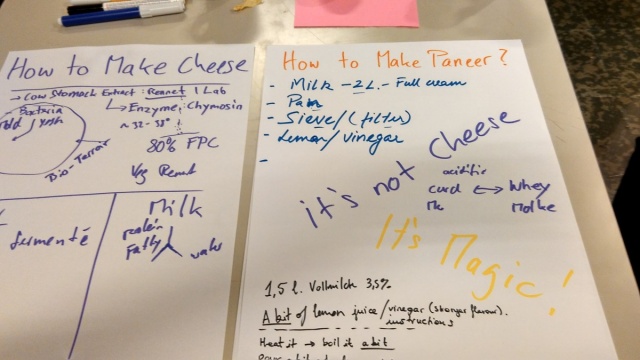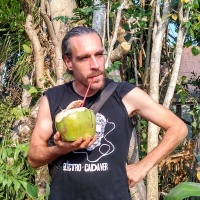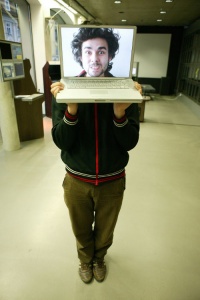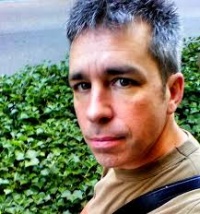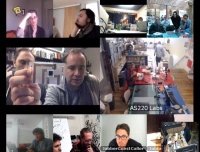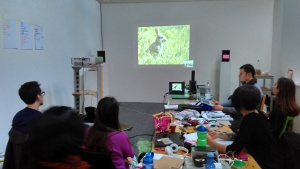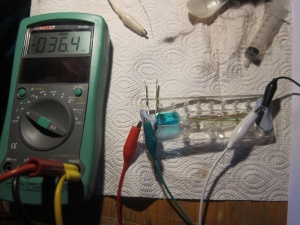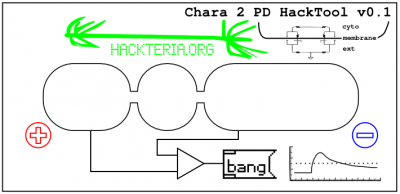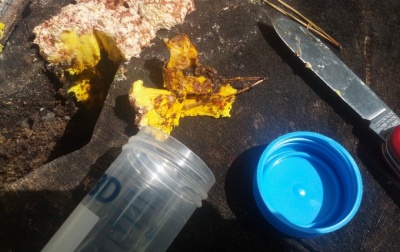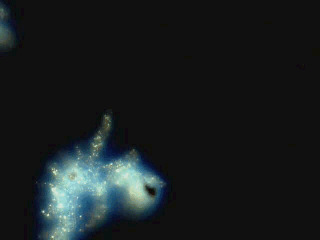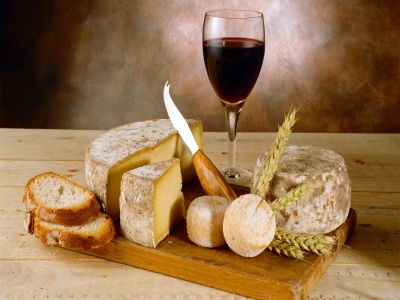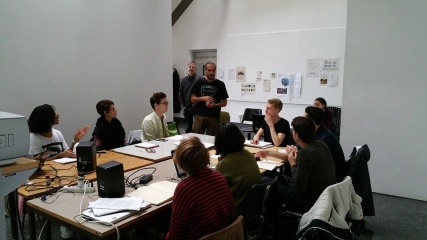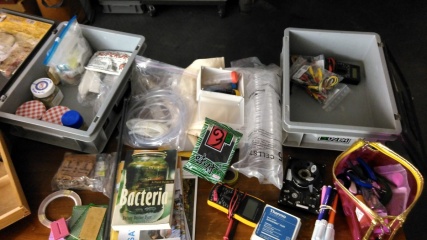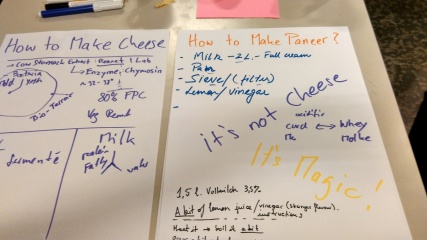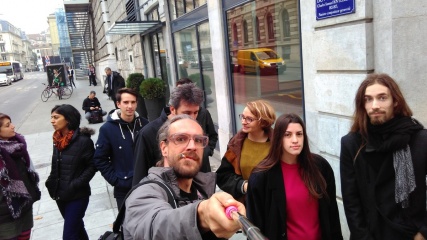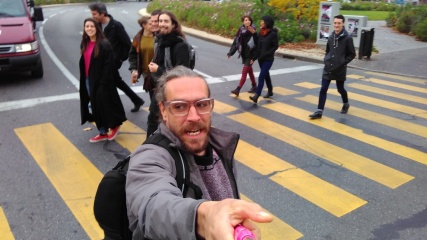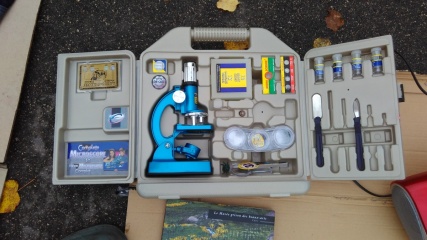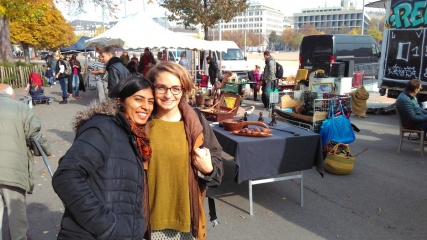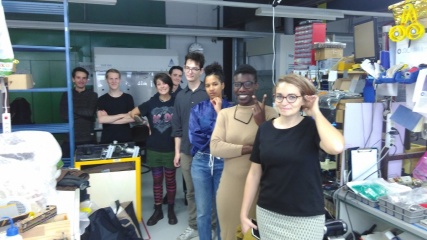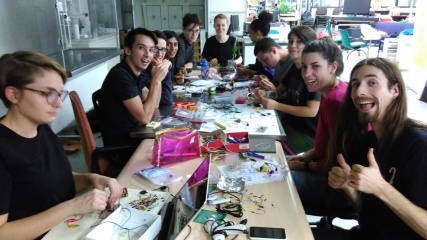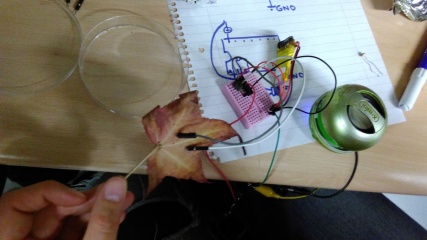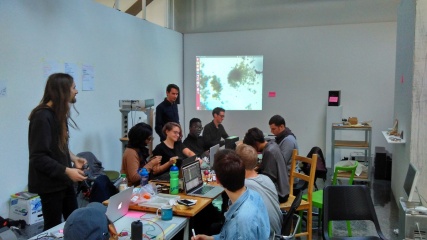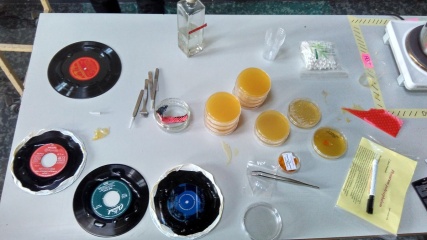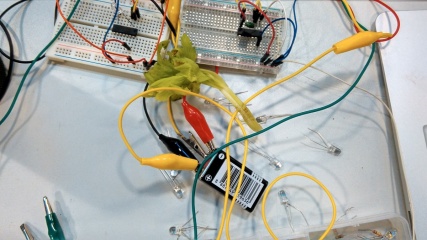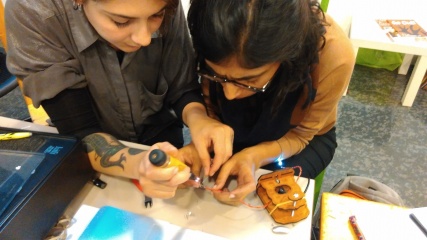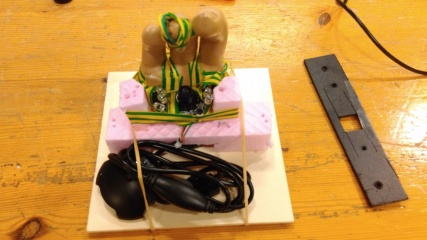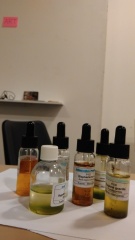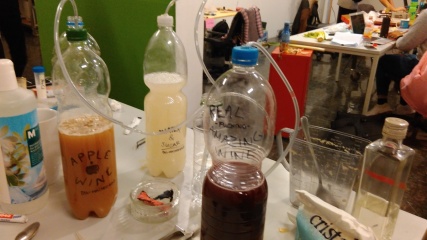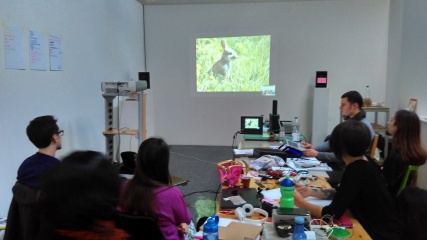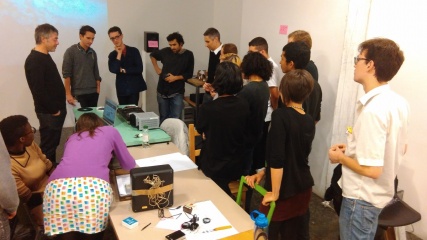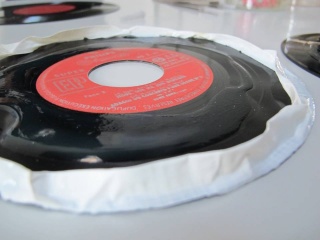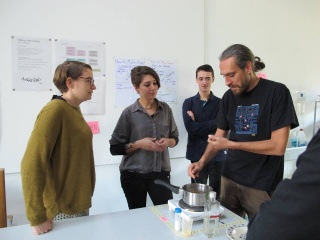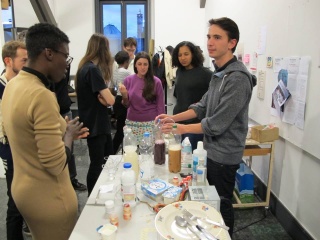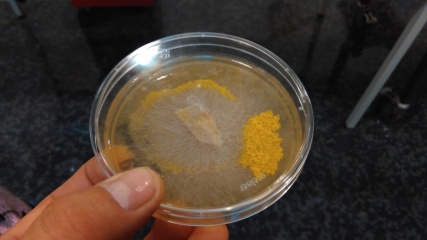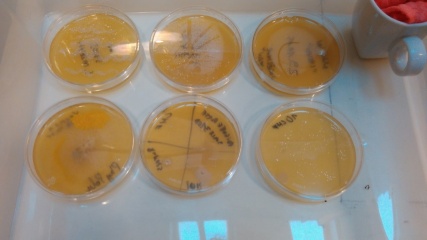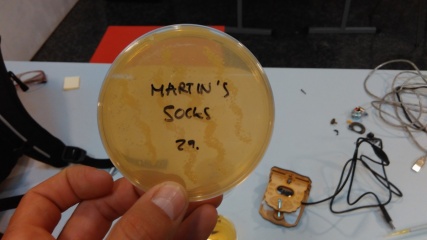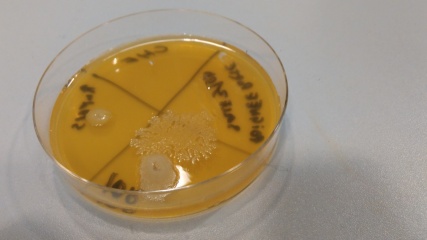The Art of BioHacking - HEAD
See the info from the course february 2013 The Art of BioHacking or How to make Cheese and Wine, HEAD, Geneva and some reflections also on fbook.
Contents
- 1 Overview
- 2 Mentors
- 3 Participants
- 4 Schedule
- 4.1 Day 0 - Monday 26. Oct | Independant Preparations/Research
- 4.2 Day 1 - Tuesday 27. Oct | Introduction and Setting up the Lab
- 4.3 Day 2 - Wednesday 28. Oct |
- 4.4 Special Evening Program #OpenHackuarium, Renens (VD) - Wednesday 27. Oct
- 4.5 Day 3 - Thursday 29. Oct |
- 4.6 Day 4 - Friday 30. Oct |
- 4.7 17:30 labo ouverte apéro #HEAD, Rue General Dufour, Genève - Friday 30. Oct
- 5 Nodes
- 6 Some impressions
- 7 Commons
- 8 Related courses on this wiki
Overview
This course aims at students in the field of arst with a strong curiosity to go into interdisciplinary approaches, working with life itself as a medium, critical and participatory practices and of krosss the biological science and it's subversive underground-counterpart termed "biohacking".
Besides this curiosity, the workshops is very accessible to new-comers and will introduce the students into the most basic concepts of biology, show examples from the emerging field of bioart, aswell as biohacking strategies. Through a hands-on approach it allows the students to learn and experiment themselves to interface living media with (wo)man-made technical artefacts, explore it's application for experimental living media with sound and video... and Learn How to Make Cheese!
Date
26 - 30. October 2015 - HEAD / Geneva
Location
Mentors
Marc Dusseiller
http://www.dusseiller.ch/cv/short_bio_dusseiller15.pdf
Dr. Marc R. Dusseiller is a transdisciplinary scholar, lecturer for micro- and nanotechnology, cultural facilitator and artist. He performs DIY (do-it-yourself) workshops in lo-fi electronics and synths, hardware hacking for citizen science and DIY microscopy. He was co-organizing Dock18, Room for Mediacultures, diy* festival (Zürich, Switzerland), KIBLIX 2011 (Maribor, Slovenia), workshops for artists, schools and children as the former president (2008-12) of the Swiss Mechatronic Art Society, SGMK. In collaboration with Kapelica Gallery, he has started the BioTehna Lab in Ljubljana (2012 - 2013), an open platform for interdisciplinary and artistic research on life sciences. Currently, he is developing means to perform bio- and nanotechnology research and dissemination, Hackteria | Open Source Biological Art, in a DIY / DIWO fashion in kitchens, ateliers and in developing countries. He was the co-organizer of the different editions of HackteriaLab 2010 - 2014 Zürich, Romainmotier, Bangalore and Yogyakarta.
Gordan Savičić
Gordan Savičić is fascinated by new issues of our contemporary existence caused by the effects of new media on subjectivity and its deep social implications. He is interested in imposing and applying the assumed (computed) reality within different realms to discuss its potential future and exploit. Together with Danja Vasiliev and Julian Oliver he co-authored the Critical Engineering Manifesto. Main research areas around his projects include game cultures, digital and urban interventions, architecture, pervasive computing as well as open source technologies. His participation in collaborative projects and performances have been shown in several countries and received various awards
http://www.yugo.at/processing/
https://criticalengineering.org/
https://twitter.com/frescogamba
Special Guest - Dipl.Ing. Urs Gaudenz (CH)
Urs Gaudenz is microengineer and founder of GaudiLabs. He worked for Swiss high tech companies in the field of micro sensor technology and brushless motor control. With his solid background in electronics, mechanics and software he is working in a concurrent style between the disciplines. After several years of experience as a consultant in innovation management he is now engaged as lecturer for product innovation at the Lucerne University of Applied Science and Arts. His aim is to evolve towards more balanced collaborative entities in social action, business and technology.
Remote Guests - Špela Petrič
Dr. Špela Petrič (1980), BSc, MA, lives in Ljubljana, Slovenia. Her artistic practice combines natural sciences, new media and performance. She is interested in all aspects of anthropocentrism; the reconstruction and reappropriation of scientific methodology in the context of cultural phenomena; living systems in connection to inanimate systems manifesting life-like properties; and terrabiology, an ontological view of the evolution and terraformative process on Earth. While working towards an egalitarian and critical discourse between the professional and public spheres, she tries to envision artistic experiments that produce questions relevant to anthropology, psychology, and philosophy. She extends her artistic research with art/sci workshops devoted to informing and sensitizing the interested public, particularly younger generations.
Participants
This course is open to all students from HEAD...
No previous knowledge or experience is expected, besides your curiosity in interdisciplinary practice and to learn something "new".
Antoine Siron
Gauvain Jacot-Descombes
Emma de Filippo
Martin Ashton-Lomax
Angélique Tahe
Lambert Segura
Nathalie Preisig
Nelson Schaub
Deborah Holman
Vincent de Vevey
Martin Besson
Vanessa Lorenzo Toquero
Megha Katyal
Schedule
Working times: 9h30-12h30 / 14h-17h
Day 0 - Monday 26. Oct | Independant Preparations/Research
- individual independant preparations - guided by Gordan
- browse through the hackteria website and the hackteria wiki, get inspired, confused, enlightened, curious.
Preparatory compulsary readings:
- "THE ART OF FREE AND OPEN SCIENCE", MCD#68 THE OPEN FUTURE see more info here and available for download in English and French
- Synthetic Ecology: Frequntly used terms, a comic book by the (Art)Science BLR team for IGEM 2010.
- Hackteria: An example of neomodern activism. Leonardo Online 2013, Boris Magrini. Download here: File:LeaVol20No1_-Magrini.pdf
- Prototype pour science ouverte – Hackteria: l’anthropocène comme ère des bricoleuses, by Denisa Kera. Download in French and English
- More things to read about hackteria: HSC#Related_Readings
Documentaries to watch
- DIYSECT IS A DOCUMENTARY WEB-SERIES ON DIY BIOLOGY AND BIOART. I suggest Part 1 and Part 3 mostly.
- more coming soon
Homework
- New Art/Science Affinities free for download. Please read through it briefly and select one article/project that inspires you and present it during the introduction round with a few sentences, what it is and why it inspired you.
Day 1 - Tuesday 27. Oct | Introduction and Setting up the Lab
Morning
- Arrival of mentor
- Introduction, Hackteria | Open Source Biological Art
- Personal introduction, Dr. Marc Dusseiller
- short group introductions
Afternoon
Setting up the lab
- un-boxing workshop | A BioHacker's Lab-in-a-Box
- Let's start to make Cheese!
Day 2 - Wednesday 28. Oct |
Morning
- Equiping a Art/Bio/Hack lab: Let's go shopping aux marché au puces Plainpalais
- finish setting up the DIWO BioHackArt lab
Afternoon
- travel to Hackuarium/Renens
- Guest-participation at HTGAA http://bio.academany.org/
- mini-workshop on BioSonification
More about HTGAA "How to grow almost anything"
See more about our HTGAA participation with GaudiLabs.
What is Biofabrication and additive manufacturing, what are biotic games?
- http://bio.academany.org/doc/synthetic_development_biology
- http://bio.academany.org/doc/3d_bioprinting
Our friends from GaudiLabs are participating, see their notes:
WHY-SBS "Why Homeworks Yucks - Synthetic Biology Sucks"
Special Evening Program #OpenHackuarium, Renens (VD) - Wednesday 27. Oct
Hackuarium is an open & community-driven citizen biology lab in Renens/Lausanne.
Screening of HLab14-Documentary Seni Gotong Royong*: HackteriaLab 2014 - Yogyakarta.
Day 3 - Thursday 29. Oct |
Morning
- open sessions BioSonification cont.
- introduction into BioElectronix
- preparing media and other stuff for growing things
Afternoon
- DIY microscopes and the hunt for tardigrades
- open sessions
- let's make some kilju to prepare for the apéro
Day 4 - Friday 30. Oct |
Morning
- thinking about documentations
- open sessions
Afternoon
- Screening VERMIN [1]
- 14:30 Special Skype lecture by Špela Petrič on her recent series of works "Skotopoiesis" - Confronting Vegetal Otherness
- open sessions
- start another cheese...
- re-organize the lab
- Prepare the labo
17:30 labo ouverte apéro #HEAD, Rue General Dufour, Genève - Friday 30. Oct
- presentations and discussions about what we did...
Nodes
Open BioElectronix and BioSonification
Bioelectronix, the merging of technology and living - the hacking together of hybrid systems has been one of our core interests and brought us together at Piksel already in 2009. During this sessions we'll continue on various prototypes connecting plants to puredata, making sound with fishes, connecting brain-measurements to glitch visuals and generally exploring the possibilities of monitoring the processes of life using open source hard/software.
- Fish-Hacking aka Fishuino
- Plant Hacking aka Algae2PD interface
- Find and read more on Plant Electrophysiology
- Article by Andy Gracie on "What is Bioelectronix"
Jenseits der Schleimpilzkunst - Au-delà de l'art myxomycète
DIY Microscopy
How to make Cheese?
- Is it a hard drug?
- Making Cheese from Humans?
- Cheese (Keju) Making Experiments in Yogya
- Qu’est-ce que la présure ?
Some impressions
Commons
Related courses on this wiki
NanoHacking-UNILI
During this course, the students will be introduced into the merging disciplines of of art, science and engineering that meet at the nanoscale. But what is nanotechnology? It promises huge beneficial impact on global health, sustainable energy and novel materials. At the same time utopian visions, science-fiction scenarios and fundamental fears are clashing at discussions in society. Throughout the course, we will lift the fogs of these superficial discussions and through hands-on activities get closer to grasp the world of the small. We will build our own simple DIY (do-it-yourself) optical and electronic instruments to learn more about nanoparticles and nanosensors, how to "see" them, how to "hear" them. One key aspect of the nanosciences is the fact that the traditional disciplinary borders of physics, biology, engineering, to name a few, are merging. With the current tools and methods of understanding matter on the smallest scales of atoms and molecules, only a true collaborative and transdiscplinary approach can lead to new insight, application and constructive discourse of its societal implications.
The Art of BioHacking or How to make Cheese and Wine, HEAD, Geneva
yeah... of course related!
Hackteria Workshops in ZKM 2016
wetPONG
wet PONG introduces a creativity approach to project based learning (PBL) in microfluidics using a game concept, inspired by computer games, and the use of open-source software and hardware.
